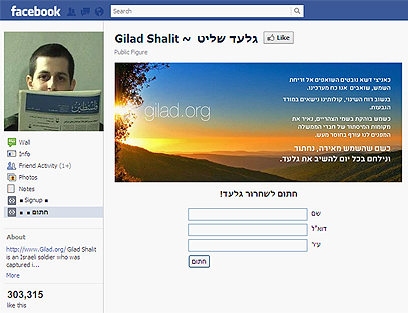
Cyber power. The Shalit page
Israeli cyberspace abuzz over Shalit deal
Social media platforms prominent in keeping Gilad Shalit a top priority on Israel's public agenda overflow with support for prisoner exchange deal
The power of social media in propelling change resonated a little louder on Tuesday, as Israeli cyberspace began bursting with joyous messages and status lines about the impending prisoner exchange deal that would end Gilad Shalit's five years in Hamas captivity.
Cyberspace played a key role in keeping Shalit's case firmly at the forefront of Israel's public agenda: Shalit was abducted in June 2006 – the first Facebook page dedicated to his release was launched three months after that.

The Shalit campaign Facebook page (Screenshot)
The five years since have seen dozens of Facebook pages and groups set up, forming a pressure-group of sorts which kept the debate over the abduction, the lengthy negotiations and the ethical dilemmas surrounding any prisoner swap very much alive.
Numerous people added messages and buttons to their profiles as a show of support with Shalit's family; and a video posted on Facebook depicting the moments of the abduction allowed social media users to experience those horrifying moment firsthand.
On Tuesday, it seems, all that clicking and hoping finally paid off, as Prime Minister Benjamin Netanyahu announced that Israel and Hamas agreed on a prisoner exchange deal that would end Gilad and his family's five-year ordeal.
The hundreds of thousands of people who clicked videos and banners into going viral for Shalit's cause were quick to respond in a joyous cyber-frenzy, with an outpour of emotions expressing great relief.
While a debate still rages over the "price" paid for Shalit's return, there is no doubt that the Israeli public has learned the power of cyber-protest, and that bigger and better ones are ahead.
- Follow Ynetnews on Facebook
- Receive Ynetnews updates directly to your desktop










